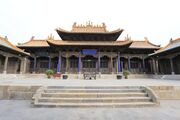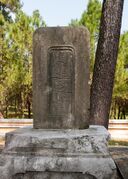Religion:Houtu
Hòutǔ (Chinese: 后土; literally: 'Queen of the Earth') or Hòutǔshén (后土神; 'Goddess Queen of the Earth'), also known as Hòutǔ Niángniáng (in Chinese either 厚土娘娘; 'Deep Earth Lady', Aoshen 媪神; 媼神; 'Old Goddess'[1] or 后土娘娘; 'Earth Queen Lady'), otherwise called Dimǔ (地母; 'Mother Earth') or Dimǔ Niángniáng (地母娘娘; 'Lady Mother Earth'), is the deity of all land and earth in Chinese religion and mythology.[2] Houtu is the overlord of all the Tudigongs ("Lord of Local Land"), Sheji ("the State"), Shan Shen ("God of Mountains"), City Gods ("God of Local City"), and landlord gods worldwide.
In Taoism, Houtu is one of the Four Heavenly Ministers, which are four of the highest-ranking gods in Taoism.
Role
Houtu was originally the god of all land and earth in early Chinese mythology, before being absorbed into Taoism as one of the Four Heavenly Ministers.
In early mythology
According to early Chinese classics Zuo Zhuan (late 4th century BC), Book of Rites and Classic of Mountains and Seas, Houtu is the son of Gonggong, being able to control the flood by installing mountains of Earth.[3][4][5] She is also the assistant god to one of the Great Five Emperors, the Huang Di, being the god of the Earth element in the Wuxing system.[6][7]
In early myths Gonggong also was related to the first Tudigong, his son Gou Long (zh) who was appointed as a god of the soil by Zhuanxu.[8]
In Taoism
In Taoism, Houtu is one of the Four Heavenly Ministers, along with Jade Emperor, Gouchen Emperor and Ziwei Emperor. In some Taoist scripts, another two gods, Changsheng Emperor and Qinghua Emperor (青华大帝), are added to constitute "Six Heavenly Ministers" (六御). The Daochang of Houtu is at Mount Jiuhua.[9]
Due to the belief that Tian (sky) represents yang and Di (earth) represents yin, most people believe Houtu is a female deity.
In Buddhism
Some scholars link Houtu to the Buddhist goddess Bhumi, which is the personification of Earth.[10]
Worship
Houtu was first worshipped by Emperor Wen of Han (in Fenyin County, modern-day Wanrong County, Shanxi)[11] and by Emperor Wu of Han in 113 BC.[12]
Yellow River Map
Houtu is featured in some versions of the myth of the Great Flood of China: Yu did not do such a great job of channeling the Yellow River into the sea, dredging the wrong way. Sacred Mother Houtu then made the Yellow River Map and sent one of her divine messenger birds to tell Yu what to do; specifically, that he should open a channel to the east, to allow the right drainage.[13]
Gallery
See also
- Chinese spiritual world concepts
- Huangtian Dadi (皇天大帝)
- Huangtian Shangdi (皇天上帝)
- Sheji (社稷)
- Tian (天) and Di (地)
- Tu Di Gong (土地公)
Notes
- ↑ Zhu, Xi; Sturgeon, Donald (2025). "《朱子語類》" (in lzh). United States: Chinese Text Project. https://ctext.org/text.pl?node=597310&searchu=%E5%AA%BC%E7%A5%9E&searchmode=showall&if=en#result. "徽宗時分祭,祀后土皇地谀,漢時謂之『媼神』。漢武明皇以南郊祭天為未足,遂祭於泰山;以北郊祭地為未足,遂祭於汾陰,立一后土廟。真宗亦皆即泰山汾陰而祭焉。」先生曰:「分祭是。」"
- ↑ Yang, An & Anderson Turner 2005, p. 135
- ↑ .
- ↑ .
- ↑ .
- ↑ .
- ↑ .
- ↑ Theobald, Ulrich. "Sheshen 社神, Local Deities (www.chinaknowledge.de)" (in en). http://www.chinaknowledge.de/Literature/Religion/personssheshen.html.
- ↑ 张, 持真 (in zh-Hans). Wikisource. https://zh.wikisource.org/zh-hans/%E6%87%BA%E6%B3%95%E5%A4%A7%E8%A7%80.
- ↑ Shaw, Miranda Eberle (2006). Buddhist Goddesses of India. Princeton University Press. p. 237. ISBN 978-0-691-12758-3.
- ↑ . 华语教学出版社. Sinolingua.. 2010. p. 63. ISBN 978-7-80200-985-1.
- ↑ "Hou Tu - MSN Encarta". MSN Encarta. MSN. http://encarta.msn.com/encyclopedia_761582235/hou_tu.html.
- ↑ Yang, An & Anderson Turner 2005, p. 137
References
- Yang, Lihui; An, Deming; Anderson Turner, Jessica (2005). Handbook of Chinese Mythology. Oxford University Press. ISBN 978-0-19-533263-6. https://books.google.com/books?id=tUwTxocaOGsC&pg=PA182.
Further reading
- Morgan, Carole (1996). "Traces of Houtu's Cult in Hong Kong". Journal of the Royal Asiatic Society Hong Kong Branch 36: 223–225. ISSN 1991-7295. https://hkjo.lib.hku.hk/archive/files/84425bf1463f225ae6786ed46bf4b2e9.pdf.
 |



